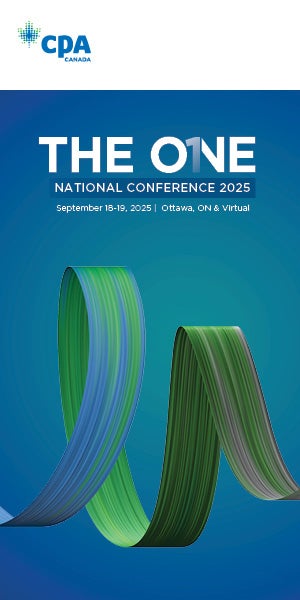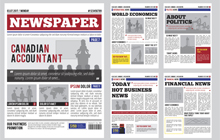Sunday News Roundup 22.03.13: Russian Big Four, Kenney gas cuts, Pillar Two, and more

Wrapping up the odds and ends in this week’s Canadian accounting news
Subscribe to our weekly newsletter and get all the week’s stories. Click here to sign up.
TORONTO, March 13, 2022 – As the war in Ukraine enters its third full week, one accounting story has emerged that is worth noting, even in a weekly roundup of news from the past week in Canadian accounting. That would be the purported withdrawal of the Big Four accounting firms from Russia.
The original story was published last week (May 6th) by Reuters, and detailed how KPMG and PwC would exit Russia, a move that would affect almost 10,000 partners and staff. Within a day, Deloitte and EY had also announced they would sever ties with Russia. As the Wall Street Journal reported, the Big Four were actually “moving more cautiously” than consulting companies Accenture, Boston Consulting Group, and McKinsey, which were the first of the professional service providers to announce plans to exit Russia.
Conflicting stories began to emerge this past week. Thomson Reuters reported that the Big Four’s audit business in Russia was actually limited, although PwC’s clients include Gazprom and Russia's central bank. According to the Financial Times, the Big Four face a fraught exit from Russia, as they are ”deeply enmeshed” in Russia. And Bloomberg Tax explained Why the Big Four’s Russia Pullout Isn’t a Clean Break, with critics saying very little would change on the ground, and the moves were little more than “whitewashing.”
All of this sounded vaguely reminiscent of a similar kind of “invasion,” the crackdown by China in Hong Kong. In 2019, the Big Four accounting firms all issued public statements distancing themselves from an advertisement by their employees, which expressed support for pro-democracy rallies. All four firms continue to operate offices in Hong Kong today.
Riding high at the pumps, Alberta announces cuts to gasoline taxes
Another outcome of the Russian invasion of Ukraine has been the steep hike in oil prices. For an oil-producing economy such as Alberta, the war is a political and economic gift that will fuel government coffers and political rhetoric for as long as Ukraine can fend off Russian forces.
Alberta Premier Jason Kenney took political advantage of the sudden windfall this week by announcing a “reverse carbon tax,” cutting 13 cents per litre off the price at the pump, beginning April Fool’s Day and lasting as long as U.S. crude remains over $90 a barrel. As noted by Reuters, “Alberta estimates the tax relief will cost its treasury C$1.3 billion ($1.02 billion), but the oil sands province is set to rake in billions of dollars in extra revenue this year as a result of higher than expected oil prices.”
The policy received criticism (Global News) for benefitting higher income families, a perspective confirmed by “tax and fiscal policy reporter” Patrick Brethour in the Globe and Mail. Coming just one week after we made fun of successive Alberta governments for raiding the Alberta Heritage Savings Trust Fund, the political ploy may boost Kenney’s low level of popularity, but is another missed opportunity to become the Norway of North America.
Fundamental changes to OECD framework a “train wreck”
Allan Lanthier has an article in the Multinational Group Tax & Transfer Pricing News (MNE Tax) in which the Canadian accountant notes that the OECD has introduced two fundamental changes to Pillar Two of the October 2021 OECD framework that was heralded as a new era in the fair taxation of multinationals.
“Pillar Two is starting to look more like a train wreck than a coherent set of rules,” writes Lanthier, calling the 70-page package “brutally complex.” Government leaders should “hit the emergency brake” on Pillar Two and the new rules introduced by the OECD.
True Crime: The accountant on board Flight 21
For afficionados of true crime stories, here's one published by the Toronto Star that involves a Canadian accountant: Who bombed Flight 21? Why one of Canada largest unsolved murders may have been the work of a passenger. Among the fascinating footnotes in the Canadian tragedy is that one of the passengers was a former partner of "Deloitte, Plender, Haskins and Sells," who was investigating one of the greatest frauds in Canadian business history: Atlantic Acceptance Corporation.
Clement Livingstone King was ultimately ruled out as a suspect because his audit led to a four-year Royal Commission into the actions of ACC's president, chartered accountant C. Powell Morgan, “one of the world’s most notorious swindlers.” (It takes an accountant to catch an accountant.) Morgan's infamy was so great that his obituary was published by the New York Times. True story.
Quick Hits
Canada's oldest Islamic charity denied postponement of CRA suspension at Federal Court of Appeal (Canadian Lawyer)
How much are taxpayers really subsidizing Canada's fossil fuel industry? (CBC)
Saskatchewan paid out $125M for oil well cleanup before getting legislative approval (Canadian Press)
Five lessons your tax return can teach you (Globe and Mail)
Another ‘unique’ tax-filing season opens in Canada amid pandemic challenges: CRA (Canadian Press)
CPA Canada announces launch of free women’s financial literacy webinar series on International Women’s Day (Press Release)
By Canadian Accountant staff.








(0) Comments